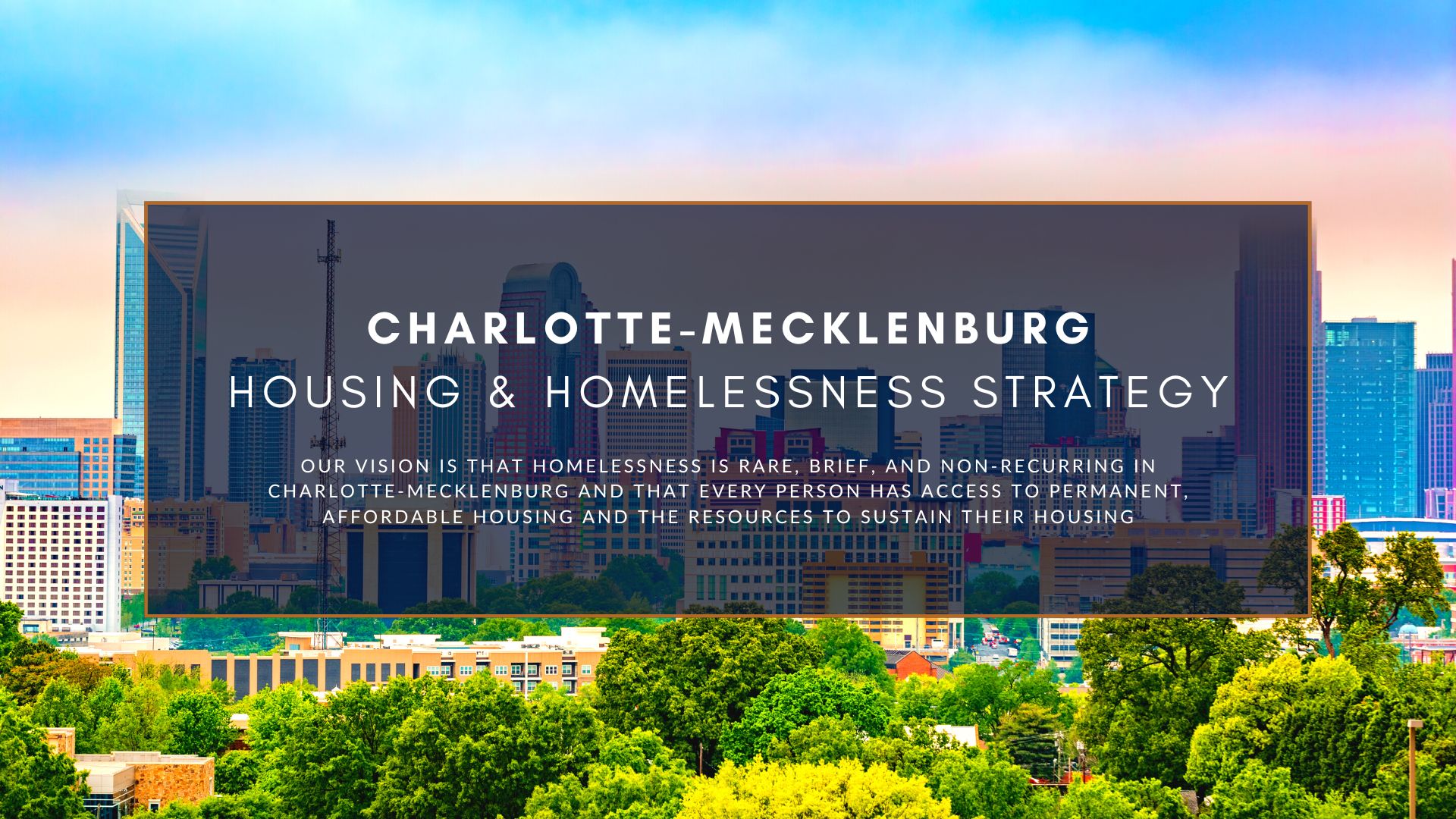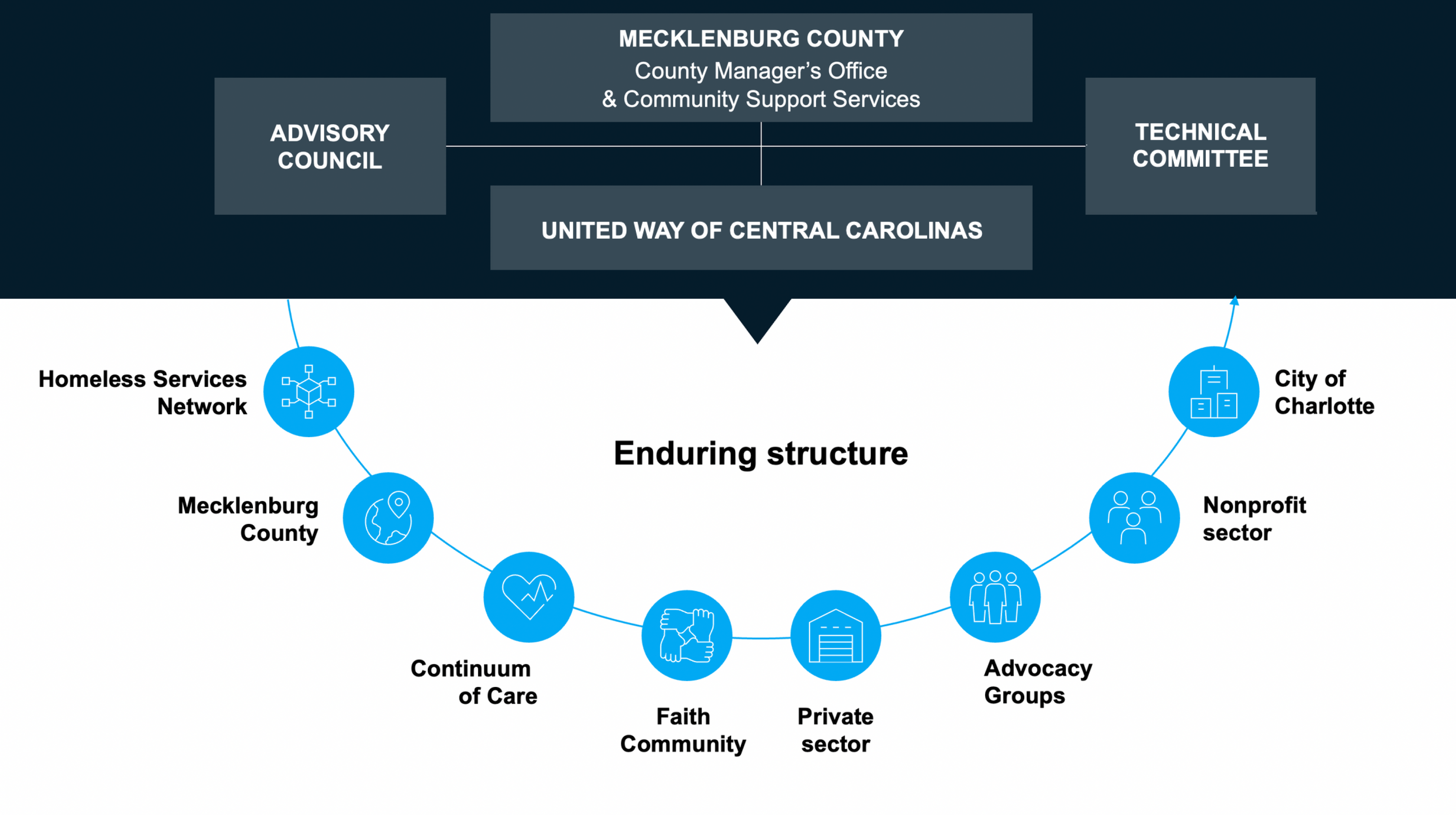Dena Diorio
County Manager
Mecklenburg County
On behalf of Mecklenburg County and the Charlotte Mecklenburg Housing and Homelessness Strategy (CMHHS), I am pleased to share the news that we have created an Enduring Structure with the United Way of Central Carolinas (UWCC) as the local non-profit lead agency.
We are thrilled that the United Way of Central Carolinas has agreed to step into this role and provide their unique expertise as we create a structure that will codify this work. This is the next step in this community-driven process, as recommended and described by the CMHHS A Home for All Strategic Framework. To read more about the January 2022 release of A Home for All Strategic Framework, including a summary I provided to the community, click here.
This update will provide an overview of the Enduring Structure, including what it is and what it will do, and ultimately, what it means for all of Mecklenburg County.
ABOUT THE ENDURING STRUCTURE
In response to feedback, including from elected officials regarding implementation and sustainability of the work of CMHHS, a path was outlined to transition from the infrastructure used to develop the A Home for All Strategic Framework, led by Cathy Bessant and Eugene Woods, to a formal public-private effort led by Mecklenburg County. Through this structure, Mecklenburg County will contract with UWCC, an entity equipped to carry out the implementation phase activities. This enables Mecklenburg County to serve in a leadership capacity while also leveraging other expertise and experience in the community.
To achieve these goals, we have embraced the Enduring Structure model depicted in the graphic above to govern the next phase of the work. Starting at the top, with the first part of the public-private partnership with Mecklenburg County: the County will provide oversight for the alignment and implementation of recommendations, and continue to support it with project management, as we have done since this work began last April. This is critical to ensure that the work ahead stays true to the work that has taken place, especially the vision and core values.
Located directly below Mecklenburg County is the new lead agency, UWCC. The main role for the lead agency is to identify and raise the funding required; develop and oversee the evaluation of this work and outcomes moving forward; and create the implementation plan to enact the recommendations from the A Home for All Strategic Framework in coordination with community stakeholders and organizations. The line connecting Mecklenburg County to the lead agency signifies the partnership which leverages the strengths and resources of each to ensure the best outcomes for our community.
In addition, two other bodies will support this partnership: a Technical Committee, which will help ensure the implementation of this work is in alignment with the community-driven process that took place over the last year and is also informed by research and best practices; and a new Advisory Council that will be led by the corporate sector to provide guidance and direction to strengthen broad, community stakeholder engagement, investment, and commitment to the recommendations. The Technical Committee is chaired by Stacy Lowry, Director of Mecklenburg County’s Community Support Services. The voice of individuals with lived experience will be included on both committees.
WHY AN ENDURING STRUCTURE
Collectively, the enduring structure will oversee the implementation of the A Home for All Strategic Framework, ensuring community alignment with all levels of stakeholders; raise dollars required to implement the recommendations; and ensure that there is adequate staffing to complete all the required responsibilities. The enduring structure is critical to keep this effort focused on systems-level change. Since we launched this work last year, we have had a variety of stakeholders across the public and private sectors involved. This broad level of engagement has contributed to the comprehensive set of recommendations in the Strategic Framework. For true community ownership, we also need each of these stakeholders to be involved in the implementation of the recommendations. We will need both public and private funding to accomplish the work recommended. The public sector, alone, cannot fund all the recommendations; nor is this work solely the responsibility of the private sector. Therefore, it is necessary to have one entity, with experience raising money, to serve in this capacity. Finally, we must evaluate both the process and outcomes of this work. Evaluating the process gives us feedback for what we need to do differently to do better; outcomes measurement will help us track progress related to the goals set forth. The lead agency will be responsible for making sure these evaluation activities take place, and for reporting progress on the framework goals to the community.
NEXT STEPS
This is an important milestone for CMHHS and our community. But, we cannot stop here. Our next steps are to continue to focus on the quick win examples in our community that connect to the Strategic Framework; and maintain the momentum since the release of the framework in January. In addition, UWCC will begin the process of hiring the appropriate staff to manage the work ahead of us; identify a consulting firm to help with the implementation strategy to transform the Strategic Framework into an Implementation Plan; and develop an operational budget with sources and uses. The current Project Management Team made up of representatives from the Mecklenburg County, the City of Charlotte, Charlotte Center City Partners, Bank of America, Atrium Health and McKinsey and Company will continue to support the transition.
SO, WHAT
Homelessness – or, more simply the circumstance in which someone does not have a roof above their head — is deeply rooted in systems and structures that benefit some, but not all. Once a person becomes homeless, it is their homelessness itself that causes further trauma, and ultimately becomes the biggest barrier to their getting back into housing.
There are currently 3,019 people experiencing homelessness, whether in shelters or outside, in Mecklenburg County. This is a 50% increase since June 2020. Worse, it is the tip of the iceberg. There are also thousands of individuals and families experiencing homelessness; living in hotels, or doubled-up with friends and family. In addition, there are simply not enough available housing units in Mecklenburg County. We need both more physical units and more subsidies to gap the cost of market rate units. More than 23,000 households at the lowest income levels need help now.
For Mecklenburg, ensuring access to and availability of permanent, affordable housing for all Mecklenburg County residents is among our top priorities. Last month, I presented my recommendations for the FY2023 Mecklenburg County Budget. Of the $12.7 million recommended for affordable housing initiatives, Mecklenburg County will support the work of the Enduring Structure.
With the pandemic, the need for a stable, permanent place to call “home” has never been more urgent. Housing is healthcare. Housing is prevention. Housing is safety. And, we all have a role to play. If we all do what we are able, then there is real hope for an end to homelessness in Mecklenburg County. And in this way, we continue to lead our community forward.
SIGN UP FOR BUILDING BRIDGES BLOG
Dena Diorio is the Mecklenburg County manager. Dena also served on the Working Group and Technical Committee as well as co-chaired the Policy Workstream of the 2025 Charlotte-Mecklenburg Housing & Homelessness Strategy.



